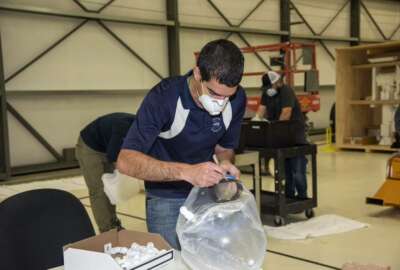
Sammies finalist at State Dept helps bring criminals abroad to justice
Monica Jacobsen has done complicated work necessary to bring evil-doers around the world to justice. She's a finalist in this year's Service to America Medals...
Best listening experience is on Chrome, Firefox or Safari. Subscribe to Federal Drive’s daily audio interviews on Apple Podcasts or PodcastOne.
Her title – attorney adviser in the Office of the Legal Adviser – sounds dry and dull. But her work is compelling and vital. My next guest has done the complicated work necessary to bring murderous foreign generals and other evil-doers to some degree of justice. And she’s a finalist in this year’s Service to America Medals program. State Department attorney Monica Ager Jacobsen joined Federal Drive with Tom Temin to talk about her work. Read more here.
Interview transcript:
Tom Temin: Good to have you on.
Monica Jacobsen: Thank you. Thanks for having me.
Tom Temin: Let’s talk about your work for a minute. What does the legal adviser, the attorney adviser, in the legal office do at the State Department?
Monica Jacobsen: Well, the Office of the Legal Adviser at the State Department is essentially the in house attorneys for the Department of State. So all the legal issues that arise out of the State Department’s operations overseas and domestically, we are the lawyers who advise on those issues. And we essentially think of the policy offices at state as our clients, they can’t fire us, that’s pretty lucky for us, but we advise them on any issues that come up in the content of State Department operations.
Tom Temin: Well, they can’t fire you, but you also don’t charge them $1,000 an hour.
Monica Jacobsen: Exactly. We don’t bill our hours either. So it works both ways. And we have just a wonderful relationship with them. It’s really my favorite part of the job to get to work with all the different clients, many of whom at the State Department are rotating as foreign service officers. And so it’s just a joy to get to work with them and see all the different expertise that they bring to the table.
Tom Temin: Now, in your sammies citation, it mentioned bringing sanctions on to Myanmar’s top military commander, three high ranking generals for atrocities they committed. Tell us about how that all worked.
Monica Jacobsen: Sure. So the way that the global Magnitsky sanctions program works is that it’s a global program that allows for sanctions on individuals and entities that commit serious human rights abuse or have some role in serious human rights abuse. And so in the context of Burma as you are, I think, well aware, there has been a really awful series of atrocities against Rohingya there. The department has determined that those acts constitute ethnic cleansing. And I was involved in that conclusion process as well, that happened in 2017. And so the sanctions are really targeting individuals and entities that are responsible for some of those human rights abuses that took place during the ethnic cleansing, and I think are a great example of how there can be tangible consequences when serious human rights abuses are committed overseas, and the way that the US can promote accountability.
Tom Temin: I guess the implication here is that even though it might look compelling on the surface, that golly this is surely abuse and we should do something about it. Nevertheless, the United States, and the State Department in particular, take the time to build the careful legal case for it, rather than just go emotionally from what you’re seeing in news reports.
Monica Jacobsen: Absolutely. So we build very carefully crafted evidence base packages that support these sanctions packages. So we’re not just saying as a blanket statement, we know these people are bad people, you know, we’ve, we’ve heard the rumors, we build a very carefully crafted legal package that could hold up in a court of law if needed, because these are really serious consequences. Not only is there the naming and shaming that comes with being designated, but also financial consequences of being cut off from US markets.
Tom Temin: And in doing this type of work, did you have to say go to Myanmar and take a look at some things for yourself or how do you go about your evidence gathering?
Monica Jacobsen: You know, that would have been cool. Nobody invited me to Myanmar, although in the in that particular case, we did work with our policy clients and outside groups to collect a significant amount of information in the refugee camps that were in Bangladesh regarding the abuses that took place in Myanmar. And so there was a very extensive documentation effort that took place that is actually available publicly for folks who are interested about some of the abuses that Rohingya faced. But in that case, no, I sat in my comfortable confines of my office at the Department of State and reviewed the information, much of which was really horrific. And it takes a lot to dig into that information day in and day out and review it, but it really pays off when human rights abusers face these tangible consequences, like the sanctions under global Magnitsky.
Tom Temin: And tell us a little bit about yourself. Of all the legal avenues available to minted lawyers, you chose State Department, federal service. How’d that happen?
Monica Jacobsen: Sure. Well, I really just knew once I had my law degree, I wanted to do something that had a bigger picture behind it and committing to public service felt like it would really give my work and the time that I was spending on on these legal issues meaning. So doing the legal work for the US government and ensuring that the US government respects rule of law, helps other countries understand their obligations and commitments under international law, including human rights law, it really just felt like it was an opportunity that you couldn’t have anywhere else. And where there was an opportunity to affect real change in the world, speaking as the US government.
Tom Temin: Sounds like you came at this not just as an attorney, because you could have done corporate law or tax law or any of those things — but really a sounds like you had a compelling interest in world affairs and used your legal degree as the avenue to get at it.
Monica Jacobsen: I think that that’s right. And I think of myself as an attorney, second to being part of the State Department team, my policy offices that I work with closely, we’re all working for the same goal of advancing US interests, protecting and promoting human rights, and my role in that is just a little bit different as an attorney adviser, but I like to think that we’re all working towards that broader mission, and I have the opportunity to do that as a lawyer at the State Department.
Tom Temin: And I wanted to ask you about one other incident that is mentioned in your citation from one of the upper-ups at the State Department — and that is to say that you don’t always go after institutional types of evil-doers, but there was an individual in Pakistan, a doctor who was trading in organs from indigent clients.
Monica Jacobsen: Yes, that’s right. I mean, it was a particularly egregious case. And one of the things that is really important about the global Magnitsky program as implemented through the executive order that we put out in 2017 implementing the program, is that we can go after non-state actors for their bad acts that constitute human rights abuse. And in that case, there were particularly egregious acts, as you noted in selling of organs, which is just I mean, the reports were horrific. And so having an avenue for the US government to take a stand publicly and take action against this person to promote accountability, it just didn’t exist before. And so having the program, developing a program and then being able to put together a sanction package to work to create tangible consequences for those bad acts was something that was really meaningful.
Tom Temin: So doing this type of work, do you still have basic faith in the goodness of mankind?
Monica Jacobsen: Oh, I do. I mean, I think I do spend a lot of time reading really awful evidence information, just bad acts and that’s a part of my job and, and I try not to become desensitized to it because these are real people and real atrocities are happening to them. But I get up every day and go work with a team who is trying to shed light on those bad acts to hold accountable those individuals and governments that are committing them. And if nothing gives me faith in the good of humanity, it’s just my colleagues at state because they’re really working to try to get to the right answer to make sure that rule of law is respected and to promote and protect human rights.
Tom Temin: Monica Ager Jacobsen as an attorney adviser in the Office of the Legal Adviser at the State Department, and a finalist in this year’s Service to America metals program. Thanks so much for joining me.
Monica Jacobsen: Thank you Tom.
Copyright © 2024 Federal News Network. All rights reserved. This website is not intended for users located within the European Economic Area.
Tom Temin is host of the Federal Drive and has been providing insight on federal technology and management issues for more than 30 years.
Follow @tteminWFED






